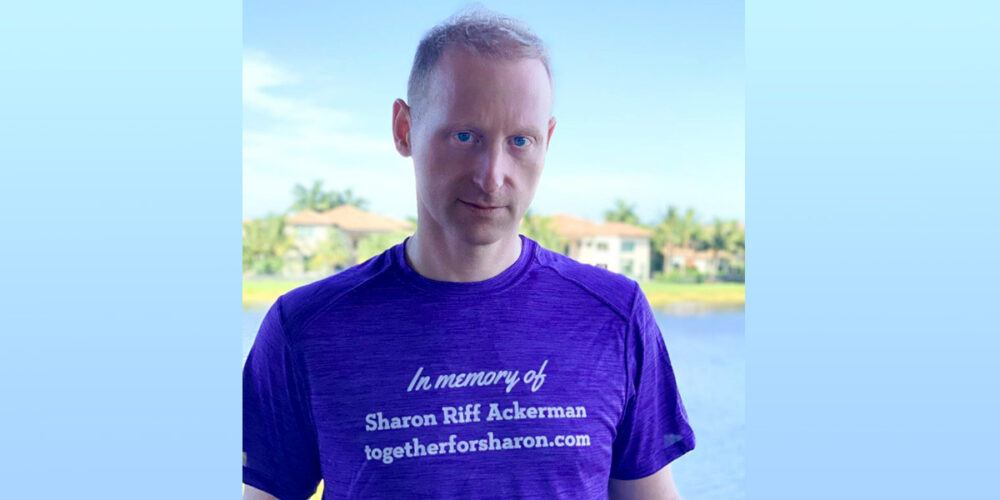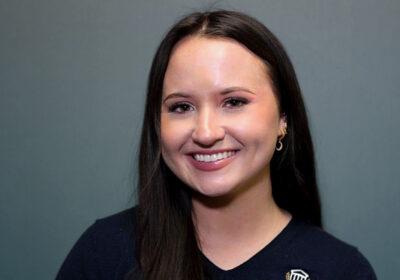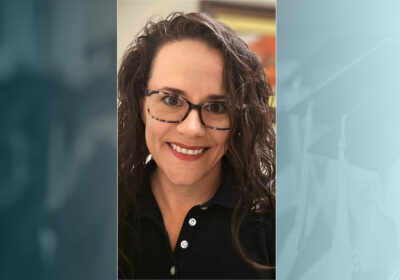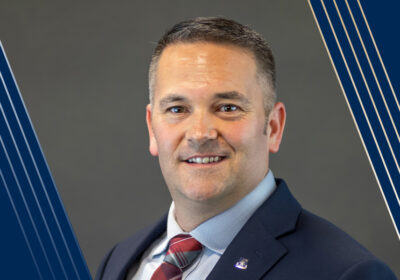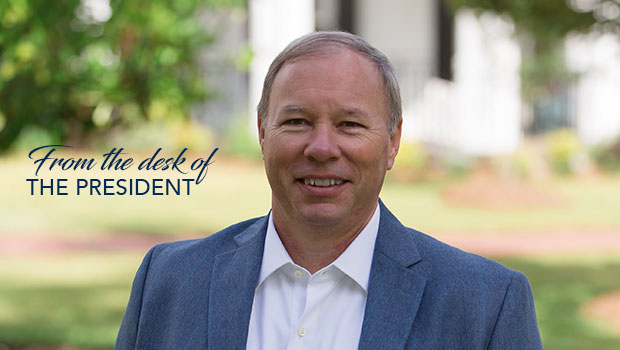April is Parkinson’s Awareness Month. The observance began on April 11, 1997, and commemorates the birthdate of Dr. James Parkinson, the physician who first identified the disease roughly 200 years ago. This chronic, neurological disorder affects nearly one million people in the United States. To recognize Parkinson’s Awareness Month, Columbia Southern University is honored to bring awareness to the disease.
George Ackerman, Ph.D., is a reserve police officer, lawyer and a full-time business instructor at Columbia Southern University. He is also a passionate advocate for Parkinson’s disease.
In 2020, George’s mother Sharon died from Parkinson’s after living with the disease for decades. After his mother’s passing, George wanted to bring positive change and ultimately find a cure. With the help of his family, he started TogetherForSharon®, a website with valuable resources for those with Parkinson’s or for those with a family member who has Parkinson’s.
The website keeps his mother’s memory alive while also helping others cope with the disease through interviews, articles, videos, news and more.
The Diagnosis
Sharon was diagnosed with Parkinson’s disease in 1998. As she, her family and thousands of others learned, Parkinson’s can be difficult to diagnose due to the variations of symptoms for each person. For her, the escalation of her symptoms was sudden and unexpected.
“The disease escalated quickly,” he said. “I only knew the word Parkinson’s, but I didn’t know this disease for many years because the only sign we saw was her left arm…she had a lot of stiffness.”
Sharon was independent and didn’t reveal her medical issues to her son. Even though she wasn’t feeling well, she never disclosed exactly what was wrong until the disease began affecting her daily activities in 2014.
Toward the end of her life, Sharon enrolled in a special trial at a university and saw numerous neurologists, physical therapists, occupational therapists and speech therapists. When various treatments proved unsuccessful, reality finally sank in for Sharon and her family: there is no cure for Parkinson’s disease.
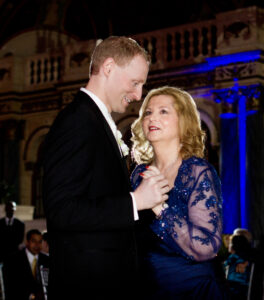
George and his mother, Sharon
As the disease progressed, Sharon found that living on her own was no longer a possibility, and that’s when her family realized she needed 24/7 care.
Becoming a Parkinson’s Caregiver
George became his mother’s caregiver and described the situation as an event that nothing can prepare you for.
“Caregiving, even as an educator, is something you cannot take a class for or even earn a degree in,” he said. “I felt like I was back in law school being thrown into court or as a police officer being thrown into the street. I just didn’t know what I was doing, so I made lists and tried to accomplish each thing, anything and everything. It’s not an easy thing to go through.”
After enrolling in the clinical trials, Sharon began having hallucinations and delusions, a possible result of drastic medication changes.
“That was the first time we heard of hallucinations and delusions. From that point on, her health just declined unlike anything we’ve ever heard of or seen. Even today I don’t understand what happened, but that’s when I became her caregiver and realized that this is worse than something I’ve ever dreamed of.”
Since every person’s symptoms differ, this can contribute to the complications of finding a cure. There are medications available in treating the disease, but they can also cause more problems to appear.
“The medications can cause side effects, so while you’re trying to slow certain symptoms, like tremors, you end up speeding up others, which is also tragic,” he said.
A Published Author
George has authored books describing what it’s like for family members who have lost loved ones or who act as caregivers to someone with the disease.
“There’s a lot of things out there that we need awareness for,” he said. There are roughly 20 to 30 million people who lost a loved one due to Parkinson’s, and I think that’s a shame. If you brought back all the people who have lost a loved one due to Parkinson’s, I feel we’d be closer to a cure because you’d have more people advocating.”
Initially, George had no intention of writing a book, but that changed when he realized there are roughly 10 million people around the world with the disease. He went on a mission and interviewed 1,000 people in preparation for writing his books.
“From Iceland, England, France, Spain, Italy, Africa, you name it, I found people who are either affected, advocates or going through Parkinson’s,” he said. “I decided to put them in a book just so people realize that they’re not alone. There are other people out there fighting toward a cure.”
Devoted to Finding a Cure
Over the last few years, there has been slight progress in diagnosing Parkinson’s. Early detection and early treatment can help slow the disease’s progression. However, science, fitness and exercise are the only known factors so far that truly slow the advancement.
“More and more people who are younger, even in their 20s and 30s, are getting it,” he said. “It’s called young-onset Parkinson’s, so it’s not just older people now – anyone can get it from all over the world, and we all must be in this fight together for a cure.”
“Parkinson’s is complicated because there are so many different issues,” he said. “It causes major stomach issues and also tremors, some have internal like my mother, and some have external like Michael J. Fox.”
Michael J. Fox publicly shared his Parkinson’s diagnosis in 1998 and has become an advocate. George met Fox along his advocacy trail. He describes him as a hero for being so public with his diagnosis and for raising more than $1 billion toward finding a cure.
Fox also led an international coalition of scientists in the development of biomarker tests, which are used to measure and track the progression of the disease. This discovery can lead to better treatments and possibly a cure.
When people question why he still advocates, his answer is clear.
“The only answer I have is I felt alone,” he said. “My mother never met someone who had Parkinson’s, which is heartbreaking. I don’t want anyone to feel alone or to go through the torture that she did, as well as our family.”
George’s mother raised him to never give up, and he feels he should help others who are battling the disease.
“If I just reach one person in the world and ensure they know they’re not alone or that they remember my mother – that she lives on – that’s why I do this.”
To learn more about George, Parkinson’s disease or to purchase his books, visit TogetherForSharon.com.
Disclaimer: These testimonials may not reflect the experience of all CSU students.
Multiple factors, including prior experience, geography, and degree field, affect career outcomes.
CSU does not guarantee a job, promotion, salary increase, eligibility for a position, or other career growth.

